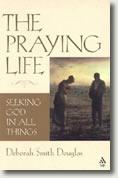A wandering Aramean was my father.
—Deuteronomy 26:5
Abraham and Sarah were the ancestors of the people of Israel, whose cultural identity was destined to be tied up forever with their wandering. But it is not just the Hebrew people who are strangers and pilgrims in this world: so are we all. Like the Israelites who wandered in the wilderness of Sinai for forty years, Christians too are embarked on a journey between our former bondage and the promised land.
At any given moment of our mortal lives, we are somewhere between who we were and who we are, by grace, becoming. This dynamic tension of the “already-not-yet” of our lives in Christ lies so deep within that it tells us who we are.
The otherwise anonymous “Pilgrim” of the Russian spiritual classic The Way of the Pilgrim represents each of us, is Everyman. The Pilgrim's hundreds of miles and many years wandering among strangers—seeking God, seeking a way to pray without ceasing—is a model for all of us, because his humility and trust and joyful hope grow in God as he continues his way.
Our status viatoris, our state of being-on-the-way, is at the heart of Christian life. It is also (the theologian Josef Pieper tells us in his little book On Hope) the basis of our hope.
Only God can bring us out of slavery to freedom; God alone calls us and leads us where we are meant to go. Our inescapable human condition is being-on-the-way, from nothingness to being. And Pieper insists that the only answer that corresponds to our actual existential situation is hope, not in our own resources but in the God who rescues us and directs our ways.
God of our hope, we thank you for guiding us in all our wanderings. May we never stray far from where you would have us go. Help us to trust that you are leading us all our lives closer to you; change us more and more into your pilgrim people.
Copyright ©2005 Deborah Smith Douglas.

